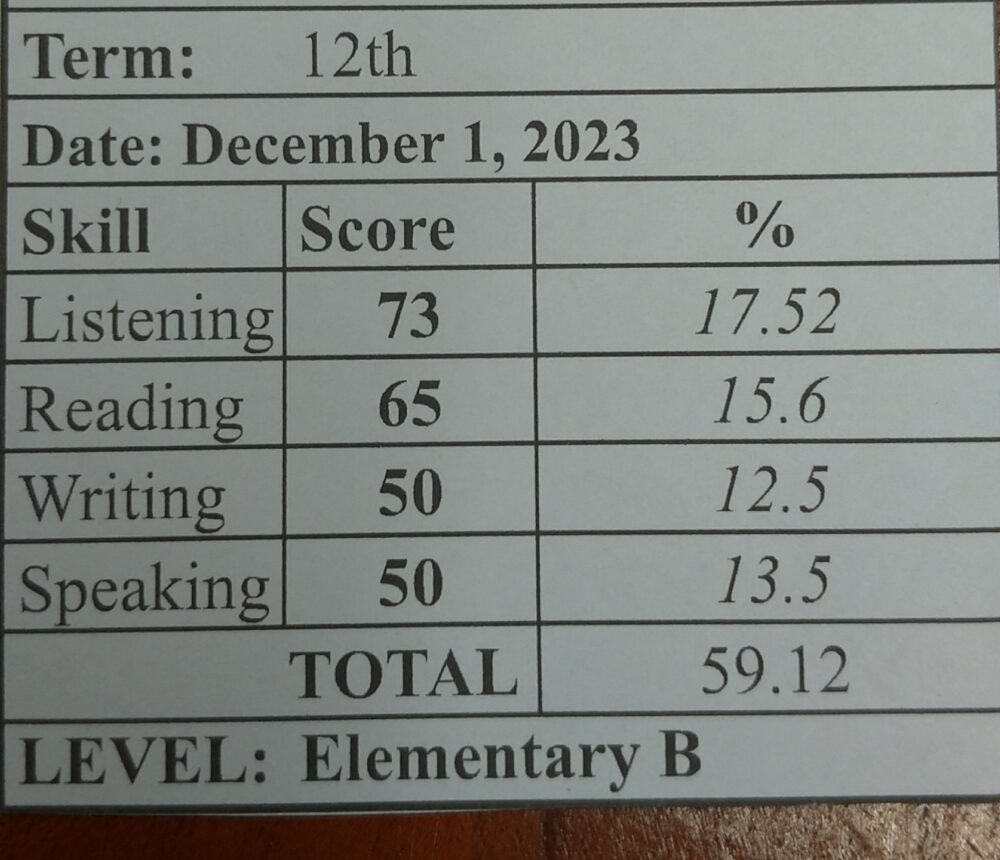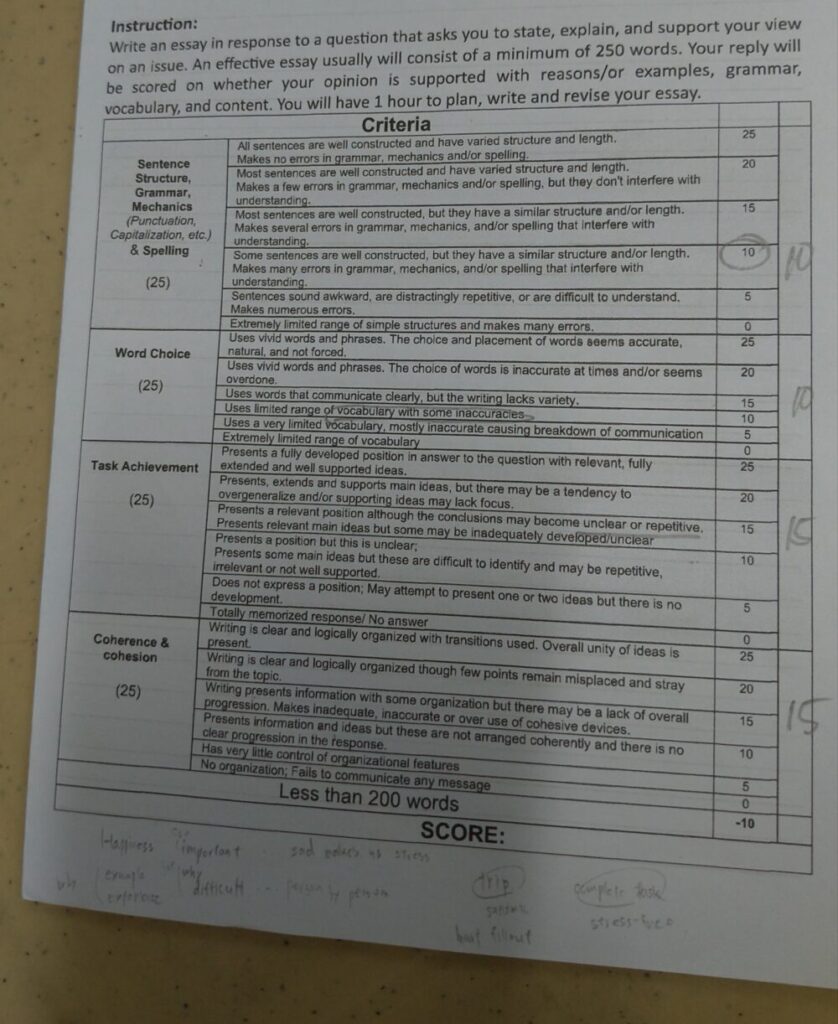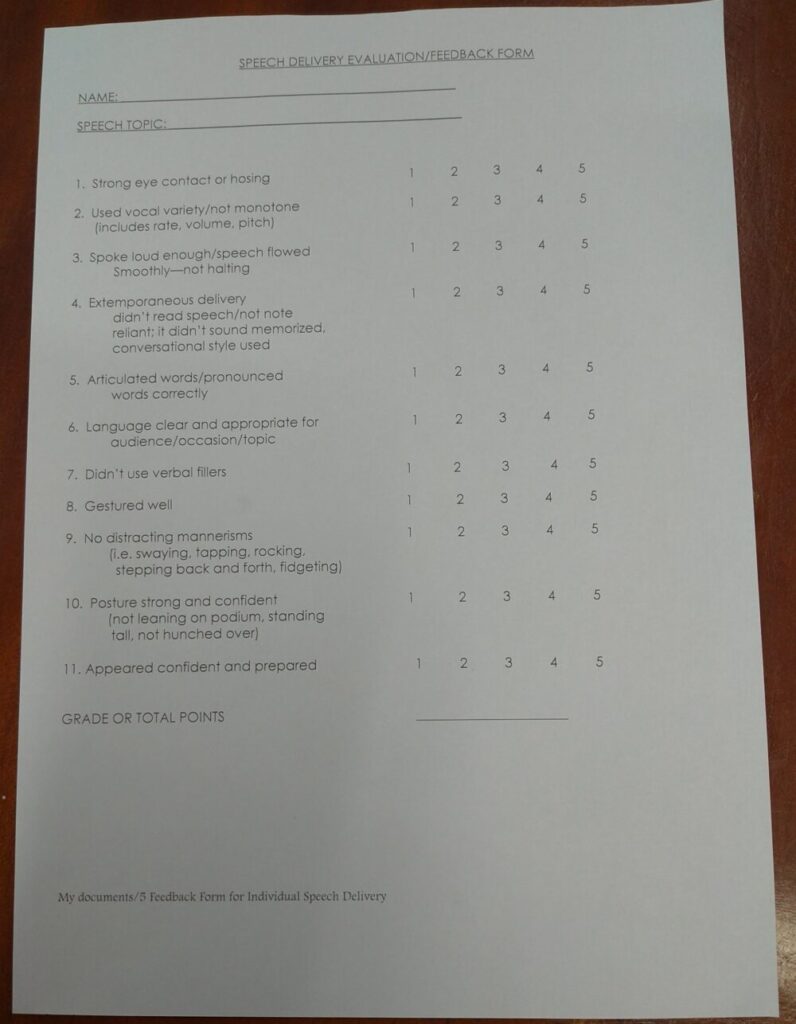It’s the 99th day (69 days left) of my temporary language study abroad program in Baguio, Philippines.
December 8 (Friday) is called Feast of the Immaculate Conception, which is a national holiday all over the Philippines, and again it is a three-day weekend in the Philippines, although there was a holiday called Bonifacio Memorial Day at the end of November, which was a three-day weekend. For international students, it is both good and bad.

Well, Term 4 for me has ended. I feel that the end is finally in sight. At the end of the term, there were the usual tests and the speeches that have become a familiar part of my life. I will tell you about my recent situation at school, including how it went.
It was tough! The results of the 5th test were…
Listening:48→65→66→69→73、Reading:53→56→72→69→65、Writing:25→45→50→65→50、Speaking:50→54→51→62→50
Except for Listening, I dropped my scores, and as a result, although I improved my level last time, I am back to my original level. That does not mean that the class content changed or anything, but I am rather shocked that my daily study did not show up in the numbers. However, I feel that the fault this time is rather mine.

Recently, I have been focusing on English articles on my blog, so I have been neglecting my studies. Last time, I spent about 30 hours on “Study Supplement” for self-study, but considering that I was missing all that time, I think it is only natural that I got the result this time.
Was it difficult? Writing test content
The writing test in which I received the lowest score was based on the following theme.
Happiness is considered very important in life. Why is it difficult to define? What factors are important in achieving happiness? Give reasons for your answer and include any relevant examples from your knowledge and experience.

This type of question was rare because until now most of the questions have been about technology, environmental issues, and that sort of thing. However, it was probably a question that could have been solved without difficulty if you used a familiar experience as an example. My answer sheet is below.

スペル、熟語Spelling and idiomatic errors: exciting (×exceiting), space (spase ×), travel to ■■ (×travel ■■), make ■■ V (×make ■■ Ving), Considering that (× Considering of that),person The expression “by person” is not common.:exciting(×exceiting) , space(spase×), travel to ■■(×travel ■■), make ■■ V (×make ■■ Ving), Considering that(× Considering of that),person by person という表現は一般的でない。
Mistakes in expressions: use of ”…2 times, forgetting to add 3rd person singular “s”…4 times, non-use of pronouns…3 times.

I also lost points for frequent use of the same words and expressions, highlighting my lack of self-study despite cutting down on my vocabulary business three terms ago. I am reminded that vocabulary is the first step in anything I do.
The trend has changed! Speaking test content
I also lost a lot of points in Speaking. The theme this time was the following.
According to the following quotation, what do you feel? “Death is not the greatest loss in life. The greatest loss is what dies inside us while we live.”

So far, I’ve heard a lot of questions like, “What’s the solution to our environmental problems?” or “What technology do you think is great? I was surprised to see a completely different format. I could understand the first sentence, “Death is not the greatest loss in life,” but “The greatest loss is what dies inside us while we live. ” is more difficult.

When I lose my curiosity or my willingness to learn, that is a more significant loss than death. So I tried to answer in a way that I want to live with a positive outlook on everything, but I just couldn’t seem to get it across. I realized that my ability to respond to unexpected questions was not yet up to par.
Nervous about my 5-minute memorize speech?
As I wrote in a previous article, I also gave a speech at the end of the term without bringing in a manuscript. I have posted the first draft of my speech in a past article, but I have to admit that the draft looks very different when I read it than when I transcribe it. I decided to compose the whole speech using words that I am familiar with as much as possible because I also need to memorize it.

The results of the speech are then graded according to the above evaluation chart. My score was 39.5 out of 55. The audience this time was five teachers and one Japanese teacher. This is the average score.

Overall, my score was low for “eye contact. It had been pointed out to me before, so I made a conscious effort to look at the entire audience, but perhaps it was not enough even if I thought I could do it in the Japanese sense. It seems that if you don’t look until your eyes meet, you will not be considered to have made eye contact in other countries.

The rest is emotional expression, which also needs to be more appealing than Japanese people think. For example, tapping on the desk, making the rounds among the audience, and other attention-getting appeals are necessary in what they consider to be a speech.
Summary
The test was disappointing, but it was a reminder that English is not so sweet that results can be achieved overnight. In response to this result, I am going to stop updating every day once I have updated for 100 consecutive days. There are many things I would like to tell you, but I will concentrate on my studies for a while.
That said, I will write articles about any special events or sightseeing information that I absolutely want to tell you about, so I hope you will find them useful. Finally, as an added bonus, I will leave the final draft of this speech at the end. If you are planning to give a speech, please try to break out of your Japanese shell – I’ll see you then!
The extra : speech draft
Good afternoon, everyone. Today’s topic is “How our differences make us unique.” …What do you think about this issue, guys? Needless to say, it’s quite difficult topic to define. So, let’s find out this issue together. Then, before I get to the main point, I’ll share a meaning of the word about “unique” in dictionary. It says that unique means “definition being the only one of a particular type”. Considering of that, the most important thing is that we become one of a type in our daily life. Right?
Then, what kind of differences do we have? When I thought about this for the first time, I came up with some ideas. For example, nationalities, skin colors, appearances and characters. And, I divided these differences into two types each. First, changeable features. Second, unchangeable features. Changeable features are like appearance and character. Unchangeable features are like nationality and skin color. We have these two types of differences. Then, I’ll introduce two stories which feature them in Japan.
First, there is a best seller book in Japan, the title is “Appearance is 90% of who you are.”. It was launched in 2005, and it has been published over one million of copies. It refers to our differences, especially our appearances. It says that our first impressions are almost decided for first 5 seconds. It bases on how we are seen against others in first contact. Therefore, we have to pay attention to our changeable differences like hair set, cloth and posture. Because
we can change them right away. If you want to be seen smart, you can choose well-groomed cloth and well-set hair. If you want to be seen remarkable, you can choose Pari’s fashion cloths and eccentric hair style. The end of the day, we can express our unique characters by controlling our changeable differences.
On the other hand, we have unchangeable differences. It can’t be helped to control ourselves. So, we have to accept and face all of our unchangeable differences forever? The answer is “No” definitely. We can manage the role of them. I’ll introduce a success story in Japan. There are some special restaurants, they are called as “RESTAURANT OF MISTAKEN ORDERS”. The waiter and waitress often mistake their orders. Why? Because all of them have dementia. They can’t tell the orders correctly, but customers accept and enjoy those mistakes. It is a new style of businesses which focus on our unchangeable differences. There were less chances to get a job for a person with dementia in Japan. However, they created a new concept restaurant, and they make diners happy every day. It is one of the success stories which features our unchangeable differences.
OK, let’s proceed to the climax. There are two types of differences. We can overwhelm and aim to be an ideal person beyond our original differences. Furthermore, there are some chances to success by taking advantage of them. In conclusion, we should realize what differences do I have and what differences should I change. It helps you to be unique.

